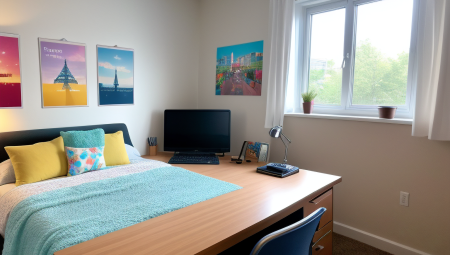In today’s fast-paced world, students often find themselves juggling a myriad of responsibilities, from demanding academic schedules to vibrant social lives. It’s a bit like trying to walk a tightrope, isn’t it? One misstep, and you could either fall behind in your studies or miss out on precious moments with friends. This article explores strategies for managing academic responsibilities while enjoying a vibrant social life, ensuring students can excel in their studies without sacrificing their personal connections and experiences.
Achieving a balance between schoolwork and social life is crucial for mental health and academic success. Imagine your mind as a well-tuned orchestra; if one section plays too loudly, the harmony is lost. This equilibrium is essential for students’ overall well-being. When you dedicate time to both study and socialising, you not only enhance your academic performance but also enrich your personal experiences. After all, life is about creating memories, right?
Effective time management is key to balancing school and social activities. Think of it as your secret weapon in the battle against stress! By mastering a few techniques, you can organise your schedules and prioritise tasks efficiently. For instance, creating a study schedule can help you allocate time for both academics and socialising. It’s like having a roadmap for your day—without it, you might find yourself lost in a sea of deadlines and social invites.
A well-structured study schedule helps students allocate time for both academics and socialising. To create an effective study timetable, consider the following tips:
- Identify your peak productivity times.
- Include breaks for leisure and relaxation.
- Be flexible and adjust your schedule as needed.
By incorporating these elements, you can ensure that your study time is both productive and enjoyable.
In our tech-savvy age, digital tools and apps can enhance time management skills significantly. Applications like Todoist or Google Calendar can assist students in tracking their assignments and social commitments seamlessly. With these tools, you can set reminders and plan your week ahead, making it easier to balance your responsibilities.
Setting achievable academic and social goals can prevent burnout. Think of it as planting a garden; if you try to grow too many plants at once, they won’t thrive. Instead, focus on a few realistic targets that allow for both study and relaxation without overwhelming yourself. This approach not only helps in maintaining your sanity but also fosters a more enjoyable student life.
Knowing when to prioritise social events over schoolwork is essential. It’s vital to recognise opportunities for socialising that can enhance your well-being without compromising your academic performance. Sometimes, a night out with friends can recharge your batteries and boost your productivity when you return to your studies!
Open communication with friends about academic commitments fosters understanding. Discussing schedules and responsibilities with peers can help maintain supportive relationships, ensuring that everyone is on the same page. After all, your friends want you to succeed just as much as you do!
A strong support network can help students navigate their academic and social lives. Cultivating friendships that encourage both study and leisure is crucial. Surrounding yourself with positive influences can make all the difference in maintaining balance.
Lastly, study groups can be a fantastic way to combine socialising with academic work. Collaborating with peers not only enhances learning but also allows for enjoyable social interactions. It’s like hitting two birds with one stone!
Table of Contents
Understanding the Importance of Balance
Finding the right balance between schoolwork and a vibrant social life is absolutely crucial for students. Imagine trying to juggle multiple balls in the air; if you focus too much on one, the others may come crashing down. Maintaining this equilibrium is not just about managing time; it’s about nurturing your mental health and ensuring academic success. When students invest too heavily in their studies, they often miss out on essential social interactions that foster personal growth and happiness.
Research shows that students who engage in social activities tend to have better academic performance. This is because a well-rounded life can enhance motivation and reduce stress. By having a supportive circle of friends, students can share their challenges, celebrate successes, and create memories that enrich their educational journey. Without these connections, the academic experience can feel isolating and overwhelming.
Furthermore, the skills developed through social interactions—like teamwork, communication, and empathy—are invaluable in both personal and professional realms. Therefore, balancing schoolwork with social life isn’t merely a luxury; it’s a necessity for holistic development. Remember, it’s not just about hitting the books; it’s about creating a fulfilling life that prepares you for the future.
Time Management Techniques
Effective time management is the secret sauce that allows students to juggle their academic responsibilities while still enjoying a vibrant social life. Imagine trying to balance on a seesaw; if one side is too heavy, it just won’t work! By mastering time management, you can ensure that neither your studies nor your social life tips the scales too far. So, how can you achieve this delicate balance? Here are a few techniques that can help you stay organised and make the most of your time.
First off, creating a study schedule is essential. Think of it as your roadmap; without it, you might end up lost in a sea of assignments and deadlines. A well-structured timetable allows you to allocate specific blocks of time for studying, while also carving out moments for socialising. Don’t forget to include breaks! After all, even the most dedicated student needs to recharge.
Next, consider utilising digital tools. There are countless apps available designed to streamline your time management. Whether it’s a calendar app to track deadlines or a task manager to keep you on top of your to-do list, these tools can be game-changers. They help you visualise your commitments, making it easier to balance study sessions with fun outings.
Lastly, setting realistic goals is crucial. It’s tempting to aim for the stars, but setting yourself up for failure can lead to burnout. Instead, break down your academic and social goals into manageable chunks. This way, you can celebrate small victories while still making time for friends and fun. Remember, it’s all about finding what works best for you!
Creating a Study Schedule
Creating a well-structured study schedule is like crafting a roadmap for your academic journey. It not only helps you manage your time effectively but also ensures that you have ample opportunities to unwind and enjoy life outside of your books. Think of it as balancing on a tightrope; one misstep can lead to a tumble into chaos. So, how do you maintain that equilibrium?
Start by identifying your peak productivity times. Are you a morning person, or do you thrive in the evening? Once you know when you’re most alert, allocate your most challenging subjects to those slots. This way, you’re not just working hard but also working smart. For instance, if you find that you grasp complex concepts better in the morning, reserve those hours for subjects like mathematics or science.
Next, incorporate breaks into your schedule. It’s essential to give your brain a breather! Consider the Pomodoro Technique, where you study for 25 minutes and then take a 5-minute break. This method keeps your mind fresh and focused. Here’s a simple breakdown:
| Study Duration | Break Duration |
|---|---|
| 25 minutes | 5 minutes |
| 25 minutes | 5 minutes |
| 25 minutes | 15 minutes |
Finally, don’t forget to include social activities in your schedule. It’s crucial to set aside time for friends and relaxation. After all, a healthy social life can recharge your batteries and enhance your focus when you return to your studies. By planning your week ahead, you can ensure that you’re not just surviving but thriving!
Utilising Digital Tools
In today’s fast-paced world, digital tools have become essential allies for students striving to maintain a healthy balance between their academic and social lives. These tools not only help in organising tasks but also ensure that you’re making the most of your time. Imagine having a personal assistant right in your pocket! With the right applications, you can track assignments, set reminders, and even plan social events without missing a beat.
For instance, using calendar apps like Google Calendar or Microsoft Outlook allows you to visually map out your study sessions alongside your social commitments. You can colour-code your activities, making it easy to see at a glance when you’re free to catch up with friends or when you need to hit the books. Additionally, task management apps such as Todoist or Trello can help you break down your workload into manageable chunks, ensuring you don’t feel overwhelmed.
Furthermore, many students find that collaboration tools like Slack or Discord enhance their study sessions. These platforms not only facilitate communication but also allow for the creation of study groups where you can share resources and support each other. By leveraging these digital tools, you can transform your approach to both study and socialising, making your academic journey not only productive but also enjoyable.
Setting Realistic Goals
Setting realistic goals is essential for maintaining a healthy balance between schoolwork and a vibrant social life. It’s like crafting a recipe: too much of one ingredient can spoil the dish. By establishing achievable targets, you can ensure that both your academic and social needs are met without feeling overwhelmed. Start by assessing your current commitments and understanding your limits. Ask yourself, “What can I realistically accomplish this week without burning out?”
Consider breaking down your goals into smaller, manageable tasks. For instance, instead of aiming to study for five hours straight, try setting a goal to study for one hour, followed by a 30-minute break. This method not only boosts productivity but also allows time for socialising. Remember, it’s important to celebrate small victories along the way. Each time you complete a task, take a moment to acknowledge your achievement, whether it’s treating yourself to a coffee with friends or enjoying a favourite TV show.
Additionally, keep in mind that flexibility is key. Life is unpredictable, and sometimes social events may clash with study time. Being adaptable with your goals can help you navigate these situations without stress. Aim for a balance that feels right for you, and don’t hesitate to reassess your goals as your academic journey progresses.
Prioritising Social Activities
When it comes to balancing schoolwork with a vibrant social life, knowing when to prioritise social activities can make all the difference. Imagine your social life as a delicious cake; if you focus solely on the frosting (schoolwork), you might miss out on the rich layers beneath. It’s essential to recognise that socialising isn’t just a luxury; it’s vital for your mental health and overall well-being. So, how do you decide which events to attend?
Start by evaluating your commitments. If you have a big exam coming up, it might be wise to skip that party. However, if it’s just a casual get-together, consider attending. Balancing these decisions is key. Here are a few pointers to help you:
- Assess Your Workload: Before committing to social activities, take a moment to review your academic obligations. Are there pressing deadlines or upcoming tests?
- Choose Meaningful Events: Not all social gatherings are created equal. Prioritise events that foster genuine connections and joy.
- Mix Study with Socialising: Consider inviting friends to study sessions. This way, you can get your work done while still enjoying their company.
Ultimately, the goal is to create a harmonious balance where both your academic responsibilities and social life can thrive. By prioritising wisely, you can enjoy the best of both worlds, ensuring that your college experience is not only about grades but also about making lasting memories.
Effective Communication with Peers
Open communication with friends about academic commitments is not just a nice-to-have; it’s a necessity for fostering understanding and support. When you share your study schedule, you create a mutual respect for each other’s time and responsibilities. Imagine trying to balance a tightrope while juggling—it’s pretty tricky, right? This is what managing schoolwork and social life can feel like without effective communication.
Discussing your academic workload with your peers helps them understand when you might be too busy to hang out. It’s all about setting the right expectations. For instance, if you have a big exam coming up, let your friends know. They’ll appreciate your honesty and may even adjust their plans to accommodate your study time. This way, you’re not just friends; you’re a supportive team.
Moreover, consider forming a study group where communication flows freely. Not only does this allow for collaborative learning, but it also strengthens friendships. Sharing ideas and tackling difficult subjects together can turn a daunting study session into a fun and interactive experience. It’s like having a built-in social life while hitting the books!
To enhance your communication skills, try to:
- Be open about your academic challenges.
- Encourage your friends to share their schedules.
- Set regular check-ins to discuss workload and social plans.
In conclusion, effective communication with peers is the backbone of maintaining a healthy balance between academic responsibilities and social life. By being open and supportive, you’re not only improving your own experience but also enriching the lives of those around you.
Building a Supportive Network
Creating a supportive network is vital for students as they juggle the demands of academic life and social engagements. Imagine trying to climb a mountain alone; it’s tough! But with a team, you can reach the peak together. This analogy holds true in the context of education and friendship. When you surround yourself with peers who understand your academic pressures, you create a safety net that fosters both motivation and accountability.
Start by identifying friends who share similar academic goals. These relationships can lead to forming study groups that not only enhance learning but also provide a platform for social interaction. For instance, you might schedule weekly study sessions where you can tackle difficult subjects together while enjoying snacks and laughter. It’s a win-win situation!
Moreover, don’t hesitate to reach out to classmates who may be struggling. Offering your help can strengthen your bond and create a supportive atmosphere. Remember, a network thrives on mutual support. Here are a few tips to cultivate this network:
- Be open: Share your academic challenges and listen to others.
- Encourage each other: Celebrate small victories together.
- Stay connected: Use social media or group chats to keep in touch.
In essence, building a supportive network is not just about academic collaboration; it’s about creating lasting friendships that enrich your university experience and help you thrive both in and out of the classroom.
Encouraging Study Groups
Study groups can be an absolute game changer for students looking to balance their academic and social lives. Imagine this: you’re surrounded by friends, diving deep into a subject that once felt like a mountain to climb. Suddenly, that mountain becomes a series of manageable hills, all thanks to the power of collaboration! Why study alone when you can learn together? Not only does it make studying more enjoyable, but it also fosters a sense of community and support among peers.
When you gather with classmates, you can share different perspectives and tackle challenging topics collectively. This approach not only enhances understanding but also boosts motivation. Plus, the social interaction can lighten the stress that often accompanies academic responsibilities. Here are some key benefits of forming study groups:
- Enhanced Learning: Discussing topics with peers helps reinforce knowledge.
- Accountability: Committing to a study group encourages regular study habits.
- Social Interaction: It’s a fun way to catch up while being productive!
To get started, simply reach out to classmates who share similar goals and interests. Set a regular schedule that accommodates everyone’s availability, and choose a comfortable, distraction-free environment. Remember, the goal is to create a space where everyone feels valued and heard. So, why not give it a go? You might find that studying together not only enriches your academic performance but also strengthens friendships!
Frequently Asked Questions
- How can I balance my schoolwork and social life effectively?
Balancing schoolwork and social life is all about time management. Start by creating a study schedule that allocates specific times for both studying and socialising. Remember to include breaks to recharge!
- What are some good time management techniques?
Consider using digital tools like calendars or task management apps to stay organised. Prioritising tasks and setting realistic goals can also help you manage your time better, ensuring you don’t feel overwhelmed.
- Is it okay to prioritise social activities over schoolwork sometimes?
Absolutely! Socialising is crucial for your mental health. Just make sure to communicate with your friends about your academic commitments, so they understand when you need to focus on your studies.
- How can study groups help my social life?
Study groups are a fantastic way to combine learning with socialising. By collaborating with friends, you can make studying more enjoyable while also strengthening your friendships.





